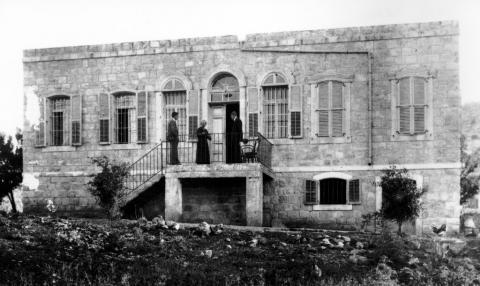Another characteristic always apparent was His silence. In the world of social and intellectual intercourse to which I was accustomed silence was almost unforgivable. From the collegiate with his, or her, "line," to the lawyer, doctor, minister, statesman-a ready answer, a witty bon mot, a wise remark, a knowing smile was stock-in-trade. They all had their "line," and it was upon their readiness or unreadiness to meet every occasion verbally that their reputation largely rested. How differently ‘Abdu’l-Bahá met the questioner, the conversationalist, the occasion:. To the questioner He responded first with silence-an outward silence. His encouragement always was that the other should speak and He listen. There was never that eager tenseness, that restlessness so often met showing most plainly that the listener has the pat answer ready the moment he should have a chance to utter it. I have heard certain people described as "good listeners," but never had I imagined such a "listener" as ‘Abdu’l-Bahá. It was more than a sympathetic absorption of what the ear received. It was as though the two individualities became one; as if He so closely identified Himself with the one speaking that a merging of spirits occurred which made a verbal response almost unnecessary, superfluous. As I write, the words of Bahá’u’lláh recur to me: "When the sincere servant calls to Me in prayer I become the very ear with which He heareth My reply” That was just it! ‘Abdu’l-Bahá seemed to listen with my ears.
Listening
Stanwood Cobb took his 75-year-old father to see ‘Abdu’l-Bahá in Boston. His father was sympathetic to Stanwood's attraction to the Bahá’í Faith, but claimed that he himself was too old to change. When his father met the Master, Stanwood was bewildered to see his father dominate the conversation. His father proceeded to enlighten ‘Abdu’l-Bahá about spiritual themes. Stanwood was shocked. ‘Abdu’l-Bahá, though, simply smiled and listened, covering them both with His love. Stanwood's father left feeling that he had a wonderful interview with the Master and Stanwood learned a lesson in humility and the power of being a good listener.
That was just it! ‘Abdu’l-Bahá seemed to listen with my ears.
. . . And when, under His encouraging sympathy, the interviewer
became emptied of his words, there followed a brief interval of silence. There was no instant and complete outpouring of explanation and advice. He sometimes closed His eyes a moment as if He sought guidance from above himself; sometimes sat and searched the questioner's soul with a loving, comprehending smile that melted the heart.
And when He finally spoke, and that modulated, resonant voice of music came, the words were so unexpected, often, so seemingly foreign to the subject, that the questioner was at first somewhat bewildered, but always, with me at least, this was followed by a calmness, an understanding which went much deeper than the mind.
